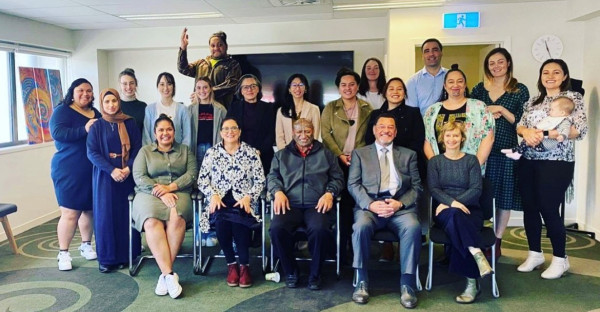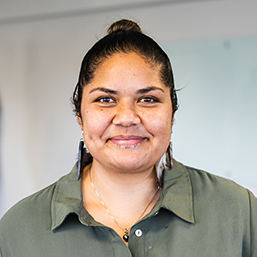
The Hāpai Te Hauora Team
For Te Wiki o te Reo Māori, we’re highlighting some of the great work that various kaupapa Māori alcohol and other drug support services do throughout the motu.
And we’re asking them what kupu (words) best describe their approach.
Today, we talk to Emmaline Pickering-Martin from Hāpai Te Hauora.

Emmaline Pickering-Martin
What do Hāpai Te Hauora provide?
Hāpai Te Hauora is a Māori Public Health NGO. Our mahi is health promotion for our whānau, hapori and hapori whānui. We aim to increase opportunities for our communities we serve to enjoy good health and be sustained by a healthy environment. Hāpai holds and has held the regional Māori Public Health contract for Tāmaki Makaurau for 20 years. A testament to our deep connection and service within the region. We currently hold 4 National Service contracts and these are The National Tobacco Control Advocacy Service, The National Coordination Service for Problem Gambling Harm, the National Public Health Workforce Development Service (Te Kākano) and the National SUDI Prevention Coordination Service. We also hold an interim service contract the Psychosocial Respose National Coordination Service which is a direct response to COVID-19 for our communities.
How has lockdown changed how you work?
Lockdown has changed the way we at Hāpai do our everyday work much like others, we are at home with our laptops, whānau and our Zui. Alongside this however has been the bigger change of serving on the frontlines as part of Te Whānau o Waipareira. The kaimahi at Hāpai were given the honour of serving our hapori whānui by helping at the pop up vaccination centre at The Trusts Stadium in Henderson. Everything from admin, needle and syringe connection to ushering whānau in to the centre, feeding whānau patiently waiting in long lines and even undergoing vaccination training. Our mahi has changed considerably from our office to the stadium. However we have still been working tirelessly to ensure that we are supporting our hapori that need it most with all of our services
Could you share a recent success that you're really proud of?
A recent success that I have been involved in for Hāpai is the release of a new international breastfeeding app with our National SUDI Prevention Coordination Service. ‘Mama Aroha’ was created by Amy Wray a Māori Midwife and lactation consultant. The app is the first ever breastfeeding app created and available internationally. It was a labour of love for Amy in partnership with Kiwa Digital, Hāpai Te Hauora, NZ Breastfeeding Association and Mokopuna Ora. It makes breastfeeding information easily accessible for those māmā who may be encountering difficulties at any point of their breastfeeding journey. Alongside this it is an excellent resource for health professionals who work with māmā at any stage of their māmā journey.
A bonus question for Te Wiki o te Reo Māori - could you tell us three kupu that you think best descibe what Hāpai Te Hauora does, or what your values are?
Three Kupu Māori I believe represent Hāpai are Aroha, Manaaki and Pono. Hāpai and the kaimahi at Hāpai have Aroha at their core. In all its many forms Aroha is the core of what health promotion truly is. Aroha for ourselves, our whānau and our hapori. Manaaki because I believe that Hāpai encompasses all that we know Manaaki to be, guidance, servitude, protection these are all integral to Hāpai as an organisation. Finally Pono, Hāpai are an organisation that is honest in all that it does and to all that it serves. I am very grateful to be a part of the Hāpai Te Hauora whānau and by extension Te Whānau o Waipareira too. There is truly nothing that can compare to working for Māori and Pasifika organisations that mahi for our people.
Related stories
Recent stories
SMART Recovery: Support groups without the need for abstinence or a higher power
We explore what it is and how it has positively affected people's lives.
Kamini: What you need to know
EDs and doctors have seen more people seeking help for opioid overdose, withdrawal, and addiction after using kamini. Here's what you need to know about the opioid-containing remedy.
Pseudoephedrine: what you need to know
Pseudoephedrine is back on the shelves. Here's what you need to know about this cold & flu medication.